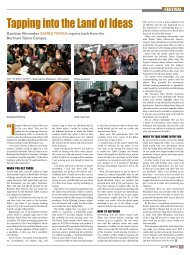Download Part 1 - size: 3.3mb - Screen Africa
Download Part 1 - size: 3.3mb - Screen Africa
Download Part 1 - size: 3.3mb - Screen Africa
Create successful ePaper yourself
Turn your PDF publications into a flip-book with our unique Google optimized e-Paper software.
NEWS<br />
Compiled by Karen van Schalkwyk<br />
the<br />
production business<br />
The worldwide recession<br />
is having a major<br />
impact on the way<br />
producers find financing<br />
and structure their<br />
productions. <strong>Screen</strong> <strong>Africa</strong><br />
speaks to a few producers<br />
and independent<br />
filmmakers about their<br />
views and what some of<br />
the solutions are.<br />
The television and film production<br />
business has not been immune to<br />
the economic slump, which has<br />
witnessed major studios,<br />
international production companies<br />
and broadcasters struggling against<br />
dwindling profits, closures or<br />
retrenchments. It has become necessary<br />
for everyone to re-think their<br />
production strategy in order to cope<br />
with tighter budgets.<br />
Desiree Markgraaff of The Bomb<br />
says that we should look to the<br />
Nigerian model. “Despite low<br />
production values, these films are very<br />
popular over the continent. They are<br />
made for very small budgets and thus it<br />
is easier to break even and the good<br />
ones make a real profit. We have<br />
abundant talent, loads of gear, good<br />
crews: there is no reason why we cannot<br />
take a risk and make a few super low<br />
budget films and see what the direct to<br />
DVD route will offer.”<br />
Johnny Muteba, an independent<br />
filmmaker, maintains that the solution<br />
resides in a coalition: “Raising funds as<br />
a coalition is much easier than doing it<br />
independently, and once a brand is out<br />
there in the market this coalition will<br />
carry much more weight approaching<br />
distributors and investors.”<br />
Mike Rix, independent producer<br />
and filmmaker says his last two films<br />
have been financed through a number<br />
of investors each putting in relatively<br />
small amounts of money, as opposed to<br />
a few investors allocating large amounts<br />
of money. “I did this purely because I<br />
found it easier to sell shares if I wasn’t<br />
asking for huge amounts of cash. I also<br />
found a number of investors online,<br />
which is a resource that local<br />
filmmakers need to make better use of<br />
in my opinion.”<br />
Eugene Snyman, also an<br />
independent filmmaker, maintains<br />
that co-productions are the best option<br />
when putting a project together. “But<br />
there is another obstacle which relates<br />
to who holds the greater share of the<br />
production when tabled or sold. I think<br />
that if finance is the objective, then<br />
gather a group of people who have the<br />
same objective as you do. Each party<br />
should have something to bring to the<br />
table. A coalition is a good solution to<br />
the economic problems we face.”<br />
Hard times<br />
In these hard times, Markgraaf says<br />
that the key aspect of coping and<br />
having to produce content is to find<br />
ways to reduce the production budget.<br />
“I think this is one of the first things to<br />
consider when the economic climate is<br />
tough. One must also consider that by<br />
cutting your budget it may hurt your<br />
film and make it less marketable.<br />
“Look at structuring deals with<br />
equipment and post companies as<br />
equity partners – that is, gear and<br />
facilities in lieu of cash. The same can<br />
be negotiated with key crew. Another<br />
possibility is to get regional funding<br />
within South <strong>Africa</strong> – local<br />
municipalities, tourism departments,<br />
etc. Also look at international regional<br />
funds, as they often compete<br />
for shoots or post-production in their<br />
region.”<br />
Ross Garland of Rogue Star Films<br />
says that the economic divide has<br />
sharpened the divide between the haves<br />
and have-nots, the blockbusters and the<br />
indies. “This is not all for the worse.<br />
The new media opportunity, which<br />
indie filmmakers have for the most part<br />
been avoiding, like in the music<br />
industry before us, has been brought<br />
sharply to fore. The solutions for indie<br />
filmmakers will lie partly at least in<br />
discovering and embracing new media<br />
models. The industry has begun this<br />
process with a spate of digitally finished<br />
and distributed films.”<br />
Rix adds: “There are always people<br />
with disposable income looking for<br />
investment opportunities. The film<br />
industry worldwide has prospered<br />
during this period of economic<br />
uncertainty, so a lot of individuals are<br />
starting to look at film investment as a<br />
solid opportunity. It is good to see local<br />
films like White Wedding performing at<br />
the box office, as it makes it easier to<br />
sell to investors when there’s a genuine<br />
chance of return on investment.”<br />
Snyman elaborates that the current<br />
downturn in the economy has led to a<br />
decline in value of production levels as<br />
well as a more cautious approach by<br />
producers regarding the type of<br />
production they take on. “When<br />
producers try and raise the finance for a<br />
project it is advisable to first review<br />
production costs and assess the total<br />
value return on investment for their<br />
clients. To put it simply, get the figures<br />
right and mould the production<br />
according to budget.”<br />
New opportunities<br />
Hard times may be difficult to survive<br />
but they can generate new<br />
opportunities, some producers have<br />
discovered. Markgraaff says that the<br />
tide will turn. “This is an ideal time to<br />
develop new material and to be<br />
recruiting, as good people will come<br />
into the market who are not normally<br />
available. The whole world is feeling<br />
the pinch and one has to look at<br />
interesting ways to make films and<br />
explore partnerships.”<br />
Muteba agrees: “This current<br />
situation presents producers with an<br />
opportunity to think creatively and<br />
master the game of doing more with<br />
less and to be self-sufficient.”<br />
Garland believes that funding will be<br />
difficult to secure. “It will remain as<br />
difficult as ever locally. If you can get<br />
hold of soft funding in this<br />
environment, you should. Otherwise<br />
reduce the budget and be innovative,<br />
like the very popular Le Donk at the<br />
Edinburgh Film Festival, which was<br />
shot in six days by Shane Meadows.<br />
Regarding the opportunities, there will<br />
be fewer films in the marketplace so<br />
this will benefit those who do get to<br />
make their films. The fundamental<br />
principles apply, but with much less<br />
competition.”<br />
Rix says that keeping budgets low<br />
will be a priority. “This will also make<br />
it easier to find the funding. Regarding<br />
opportunities, that is a tough one. I<br />
guess there is an opportunity to<br />
continue to make movies for a fraction<br />
of international budgets and hopefully<br />
infiltrate the worldwide market. We<br />
can also attract more international<br />
productions looking for locations that<br />
will save on their budgets.”<br />
Snyman says the current financial<br />
situation does in many respects allow<br />
for growth. “In the past when things<br />
were tough, like-minded people got<br />
together to save and rebuild industries.<br />
This, in my view, is what needs to<br />
happen. As filmmakers we need to save<br />
our industry and not try to create on<br />
our own, but rather do this together.”<br />
South <strong>Africa</strong> in<br />
perspective<br />
Many producers are struggling to<br />
survive, which could affect the future of<br />
the industry. Markgraaff believes the<br />
challenge is to build and retain a<br />
sustainable industry. “The relationship<br />
between the broadcasters and<br />
production sector is critical. If we do<br />
not get that balance right we will<br />
remain quasi employees to the<br />
broadcasters and not develop a buoyant<br />
sector. Without a solid foundation of<br />
businesses that are bankable we will not<br />
be able to innovate and meet demands/<br />
opportunities that digital convergence<br />
will bring. We must view ourselves as<br />
job creators and not producers pitching<br />
for work. The DTI continues to<br />
support the sector and we must seize<br />
the opportunities.”<br />
Mutaba says it is encouraging to see<br />
more films being produced. “I think<br />
there will be a lot of growth in the<br />
sector over the next couple of years.”<br />
Garland comments: “We will<br />
continue to make five to 10 films a year.<br />
I expect the number of documentaries<br />
will increase as well as micro-budget<br />
digital films. These two categories of<br />
films might shift the new media<br />
landscape and that could change things<br />
more radically for the better, with new<br />
production and distribution models.”<br />
Rix says that things will turn around.<br />
“Local films are on the way up. In my<br />
opinion, producers need to cater to the<br />
commercial market if they want to<br />
grow the industry, and that means<br />
genre movies.”<br />
Snyman comments: “Firstly, South<br />
<strong>Africa</strong> does not have an industry, only a<br />
dwindling entertainment industry on<br />
the brink of collapse. This is largely due<br />
to bad management and warped ethics.<br />
“We have organisations that were put<br />
in place to help develop the industry<br />
through financial support for producers<br />
and directors. I am saddened by the<br />
performance of these institutions and<br />
their blatant disregard for the wellbeing<br />
of the real filmmakers who want<br />
to showcase their talent. We have a<br />
pool of creative people with nowhere to<br />
exhibit their work. Why should I and<br />
others like me have to go and get our<br />
productions made in Los Angeles or<br />
London? I think a lot of really talented<br />
people will leave, as they feel<br />
unappreciated in their own<br />
country.”<br />
<br />
SCREENAFRICA – September 2009
















